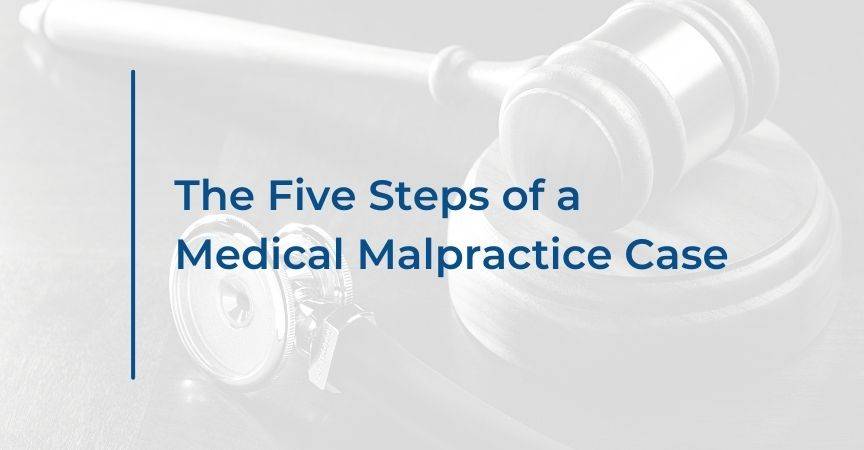Medical malpractice results when a medical professional fails to provide the proper standard of care to a patient and their actions result in injury. Every year thousands of people are injured or killed in medical malpractice cases.
If you or a loved one were injured or died due to medical negligence you have the right to file a lawsuit. The following outlines the five steps of a medical malpractice case.
1. Find Legal Counsel
In Florida, before a plaintiff can actually move forward with a claim, there are a series of steps that must be completed which set medical malpractice claims apart from other types of lawsuits.
If you believe you have grounds to initiate a medical malpractice lawsuit, the first thing you should do is to find an attorney who specializes in medical malpractice cases and has access to resources in the medical field.
It is important to pay attention to Florida’s statutes when pursuing a case. Typically, there is a limited window in which a plaintiff can sue in a malpractice case. In most cases in Florida, the plaintiff has up to two years from the date that the injury was known to file. Hiring legal counsel will help you stay on top of any deadlines and requirements.
2. Initial Investigation & Pre-filing Requirements
Your claim will begin with an assessment of case details and gathering of facts about what happened to identify causation. If the investigation into your case shows that it has merit, the process will continue.
By Florida state law, before filing, the plaintiff must obtain an expert affidavit from a third-party doctor stating that the plaintiff’s injury or a loved one’s death was in fact caused by negligence.
The plaintiff must notify all individuals or organizations that they intend to sue, attaching the expert affidavit from a qualified doctor saying that there is malpractice, as documentation. The defendant(s) in return can file responsive pleadings called “Grounds of Defense,” in which they can outline their defense and explain their innocence.
3. Discovery
Once all parties accept notifications, they enter a 90-day window that allows for communication through written correspondence in an effort to compile evidence and answers as preparation for trial. Lawyers can also begin collecting testimonies from witnesses through deposition hearings. Discovery might include information about the patient’s medical history, a doctor’s education, or specific hospital policies that directly affect the case.
4. Negotiations and Settlement
Under Florida law, courts require that cases enter into mediation before trial in an effort to reach a settlement. During this period the defendant(s)’ insurance company must respond to the claim by either accepting fault of malpractice, offering to settle, or rejecting the claim.
A settlement is generally preferred because it means the defendant has agreed to provide reparations to the plaintiff and the case does not need to go to trial.
5. Trial
If parties are unsuccessful in reaching a settlement, the case will go to trial. At trial, both the plaintiff and the defense will be able to use visual aids, demonstrations, and witness testimony to provide context to the jury. No one is able to predict the outcome of a trial but experienced and aggressive attorneys who put in the effort to make a clear and actionable claim for their client can reach the desired result.
Ted Babbitt, West Palm Beach, Florida medical malpractice lawyer, has decades of experience holding medical professionals and institutions accountable for their medical negligence. He has obtained several multi-million dollar verdicts and settlements for victims of medical malpractice, including a $10 million medical malpractice settlement for a 2-year old girl from Central Florida for a brain injury suffered during heart surgery. As a consequence of improper temperature monitoring, the child suffered serious brain damage. Discovery revealed that the surgeon had not operated on a child for nearly 20 years and that no one on the operative team had done this particular operation with any frequency.
Call today and his team will give you an honest assessment of your case and explain your legal options – (561) 375-2841 or fill out this online form.
